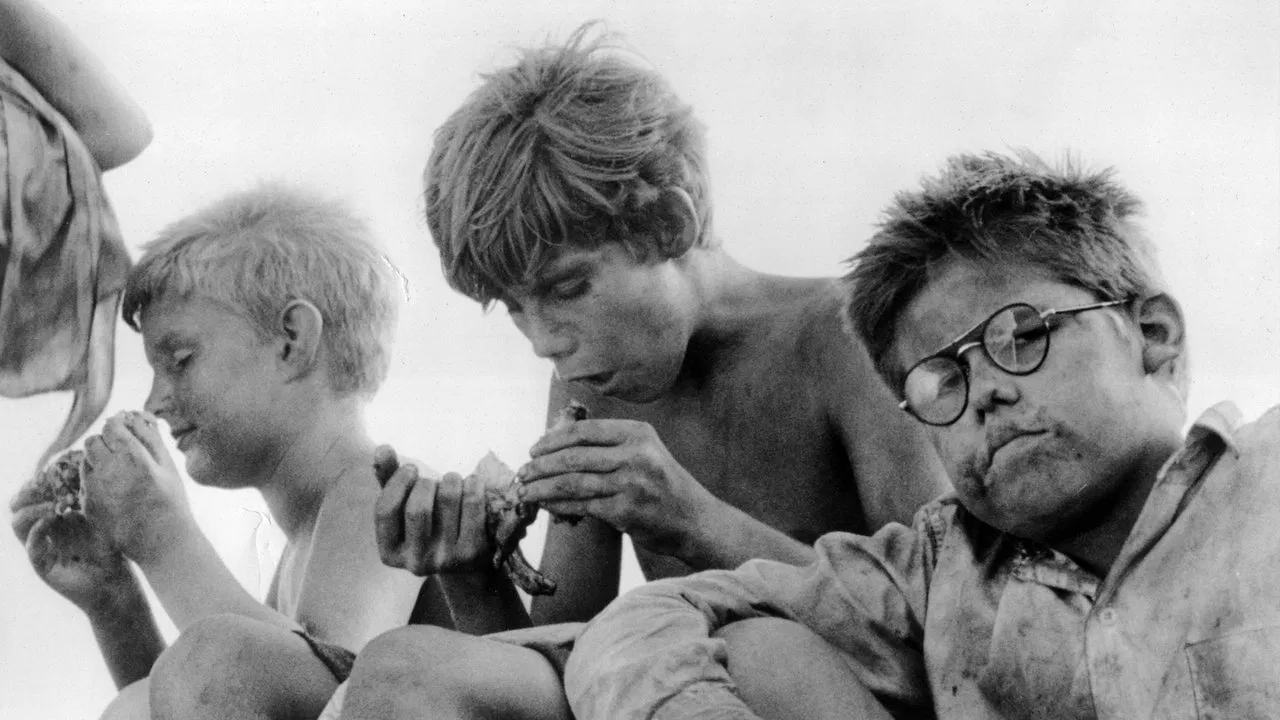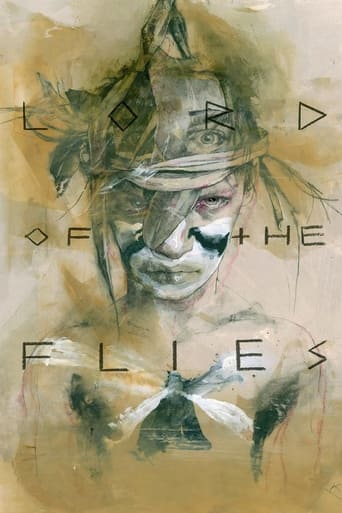

It is one of my favorit novels. because it remains the fundamental map for define the childhood, the dictatorship, the demons living in us, the temptation, the cold and hot, in same mesure, cruelty. and the adaptation of Peter Brook represents the inspired one. first, for the great cinematography . second - for lovely reflection of the essence of Wiiliam Golding masterpiece. not the last, for the performances. you feel each line of novel in this film, in its original sound and flavor and tension. you discover, again, the powerful message of the novelist. his fears. and his pesimistic perspective about the evil and its "freshness" of childre. entire universe of shadows and cruelty is reflected in the art of Peter Brook. and scene by scene I remind the period of high school when I was first time front to this magnificent book . it is an useful film. and this fact is only real important thing. for see the world from the right angle. for create, like me, a solid imafe about the demons inside us. and for become sincere. about yourself. about the others.
... View More(*Most memorable movie-quote screamed in unison by a dozen warring boys*) - "Kill! Kill! Kill!" (Filmed on a budget of just $250,000) - I would never say that this 1963 film-adaptation of William Golding's novel (of the same name) was great movie-making..... But, if nothing else - Lord of the Flies certainly did make quite a powerful statement about how quickly innocent children (who are completely isolated from adults) will form their own government and, ultimately, turn to savagery and cold-blooded violence without a second thought.Filmed entirely in Puerto Rico (but its story was set on an uninhabited island in the South Pacific) - Lord of the Flies (due to its unconventional subject matter) is particularly notable for the ultra-conservative era in film-making in which it was made.Competently directed by UK film-maker, Peter Brook - The performances of the 30 boys cast in the film were all, pretty much, improvised. None of these boys were professional actors.
... View MoreShot on a low budget with tropical backdrop and an entire cast of children. There are Four standout preadolescence characters that represent different factions about life in this inverted Island society. Ralph who is by nature very practical (the protagonist)who represents order, and early in the movie is the productive leader.Jack is the antithesis of Ralph who was strong willed and an ego maniac as he already is making the majority of the young boys into warriors. As the movie wears on Jack takes off his school uniform and transforms into a cannibal savage type complete with war painted face and palm leave loin coverings. The vast majority follows suit over time which puzzle Ralph. Then there's Simon, slender and small in stature, who's dialogue is minimal at best but gives an impression of all that pure and good in the world and most importantly doesn't sway and is non-impressionable to the savagery that's brewing around the island. Finally there's our tragic figure Piggy. portly, bespectacled and colorful martyr of the story who tends to the little ones. Piggy who is teased and badgered by the group except for Simon and Ralph. Piggy's value to the young savages is his glasses which are used to start fires. Ralph quickly loses control of the children as they transform into wild like cannibals with war painted faces and spears. Some are even naked by films end. Two reasons for this is there is no adults around and secondly no hope of rescue in sight which poses many thoughts in my mind as I viewed this movie. The mystique of this picture is the unknown from past events. Why did the plane crash. How many Adults where on board? Why did this Boarding school from England travel across an ocean to this remote location? So many answered questions which is the glue that holds your imagination.You can't help yourself to continue watching this down hill spiral of this juvenile civilization, School yard style. Great performances by James Aubrey as Ralph Tom Chapin as Jack. Tom Gaman as Simon and Hugh Edwards as Piggy. Cleverly, the filmmaker's shot this movie in black and white as to not let the greenery overtake the somber and cannibalistic tone of the movie. On a spoiling note the death scenes of Piggy and Simon are heart wrenching. Film makers use music to soften the blow but not in this movie when it comes to death. When you see an innocent dead child floating in the murky water it shocking. A must see film on life's lessons that show's that human's young and old can easily fall into their inner demons.To quote Emma Cole, "...Our souls may be consumed by shadows,but that doesn't mean we have to behave as monsters."
... View MoreWilliam Golding's timeless novel Lord of the Flies is one of the many works of literature that has continuously etched itself into the English reading curriculum, much like Harper Lee's To Kill a Mockingbird and William Shakespeare's Romeo and Juliet. Golding's novel isn't a racial parable or a story about star-crossed lovers, but a dark, biblical allegory with a message about as crippling and as thought-provoking as anyone I can think of. It's not an easy read, with lots of imagery spelled out in grand detail and a plethora of ambiguous symbolism. And for that matter, it's not a very easy watch. One must go in prepared and open-minded to truly enjoy what Peter Brook's Lord of the Flies brings.The story is simple. After a horrific plane crash, a group of young schoolboys are left stranded and ill-equipped to try and sustain themselves on a remote island surrounded by water as far as the eye can see. There are no adults, the pilot is dead, and their home country of England is now involved with what will be known as World War II. We are first greeted with plucky young Ralph (Aubery), who will later become selected leader of the island, with his leadership resembling a fair and balanced democracy. Ralph's best friend on the island is a chubby boy named Piggy (Edwards), who remains realistic about the situation that the boys will be condemned to this island until they die.Another boy on the island named Jack (Chapin), quickly embraces life on the island, and turns to barbaric and savage intentions as the antagonist whose only care is to hunt and kill. He becomes symbolic for Satan, while another boy named Simon (Gaman) becomes almost a Christlike figure, with his excessive assistance to the boys and authentic kind nature.The moral of the novel and film is quite interesting, and is open for some heavy debate. Golding states that the only reason humans are kept in place and are civilized is because of law and order, and if those laws were ever to be lifted at any given time, that at first, people would try to remain civil, but would soon become virtually consumed by their savage instincts. We act on our superego, meaning we do what we believe is right, and if laws didn't exist, we'd most likely act on our id, our impulsive inner-evil if you will. Over the course of the film, it seems like in no time these once well-kept, collective children are consumed by their own inner-desires to act on impulse and not fear any consequences at all. This makes for a very unsettling picture, especially in the last half-hour when some unthinkable scenes occur.Hook's direction sets up a consistently tense and very detailed atmosphere. The cinematography is also commendable, only complimented by the dreary silence because of the choice to omit any formal music. Hook manages to incorporate some rather tricky tracking shots, and some birds-eye shots that are difficult to successfully pull off. Apparently, the film was shot on an island in Puerto Rico, and very little scripting was done. Much of the dialog is improvised, which works for and against the film simultaneously. There is a great feeling of authenticity when a film or show is improvised, but here, the children, all of them I believe to be first time actors with some never even returning to film again, recite their lines in a strange, unnatural way, which takes time to get used to. It provides inevitable corniness, but thankfully, can't derail the entire film all together.Not to mention, the pacing feels a little off. Sometimes, long periods of silence go on, and we are unsure of where the film is going. Although a little odd, it provides time for the cinematography and atmosphere to take effect, projecting a feeling of dread and uncertainty. Throughout the film and the novel, the boys are fearing, what they call "the beast," which refers to the unknown on the island. The boys constantly believe some creature is out to get them, and this fear consumes them, much like their feelings of barbarism and savagery. This is where the film begins to hit home. What kid didn't dream of living by his own rules, in a place where he/she could do and say whatever they wanted? It isn't until that dream becomes a reality do we begin to regret our wish. The true tragedy is these boys didn't wish for this.Lord of the Flies was a challenge to adapt to film, and director Peter Brook clearly accepted it with gratitude and honor. He has great respect for Golding's original work, keeping the biblical theology and references in place, and rarely tampering the original events, making this a successful adaptation. I still feel the need to reiterate the fact that the phrase "the book is always better than the movie" is a void statement, seeing as the film adaptation can never be truly everything you wanted it to be. This is because the film is based off the director and/or screenwriter's interpretation of the story. As far as that works, Brook's is on par with mine, but perhaps the more important question is, is it on par with yours? Starring: James Aubrey, Tom Chapin, Hugh Edwards, and Tom Gaman. Directed by: Peter Brook.
... View More